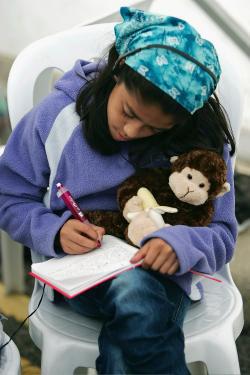When Emily Lindin was 11 years old, her classmates decided that she was a slut. For the next few years, she was “harassed incessantly at school, after school, and online,” she says. This was 1997, before Gchat conversations and Twitter streams kept a running digital transcript of pre-teen life. Instead, Emily kept a detailed diary of the events in a set of spiral notebooks.
Fifteen years later, she’s exhumed her childhood entries, and is publishing them in chronological order on a Tumblr she calls the UnSlut Project. All names have been changed (including Emily’s, a pseudonym). The result is part middle school soap opera, part public service. “I’d like The UnSlut Project to serve as an ‘It Gets Better’ project for girls bullied for their sexuality in middle school,” says Emily, now 27. A typical entry unfolds in the form of a three-way phone call on the family landline: “Aaron said he had heard that Zach ‘ate me out,’” 11-year-old Emily wrote. “I wasn’t sure what that meant, but I said it wasn’t true, just to be on the safe side.”
In the wake of Steubenville, the internet has been pinned as a destructive force in youth culture—porn warps minds, Instagram enables sexual assaults, and Twitter amplifies sexual bullying. By taking an analog diary from the ‘90s and transplanting it to Tumblr, the UnSlut project reminds us that technology is not to blame for sexual shaming—our culture is. “It’s my hope that, in addition to providing perspective to young girls, these entries can refresh adult readers’ memories,” says Emily.
After all, sexual shaming has always found a way. In 1692 Salem, rumors of young female witchcraft spread by mouth. In the 1994 TV series My So-Called Life, Angela Chase was shamed via a note passed through her high school hallways: “Angela & Jordan Catalano. COMPLETE SEX!!! In his car. Can you believe her?” In 2004’s Mean Girls, Lindsay Lohan & co. traded nasty sexual insults about each other through a scrapbook. Social media is just a new conduit for old sexual attitudes. While opportunities to watch porn and snap selfies have exploded, the Rape, Abuse & Incest National Network estimates that sexual assault rates have actually fallen 60 percent in recent years. And despite the fear that the Internet is prematurely sexualizing our youth, teenagers are having sex later than they did in 1995, and are more likely to use birth control when they do.
In Emily’s diary, the bullying hops between parents’ backyards, landline phones, and AOL Instant Messenger. “I have a very painful memory of watching an instant message window pop up from an account called DieEmilyLindin and reading the message: ‘Why haven’t you killed yourself yet, you stupid slut?’” Emily says. At the time, AIM seemed like an exciting and frightening new technology; now, it looks like a rudimentary tool. Today, teenagers can escape the halls of junior high (and anonymous IM windows) to connect with peer communities online that directly discuss slut-shaming and bullying. Girls today “have access to something I didn’t in 1997: a supportive online community of women who understand where they’re coming from and who won’t judge them,” Emily says. “I’m glad to be able to use social media to turn my preteen experience—something that has always been humiliating and private—into something positive.”
